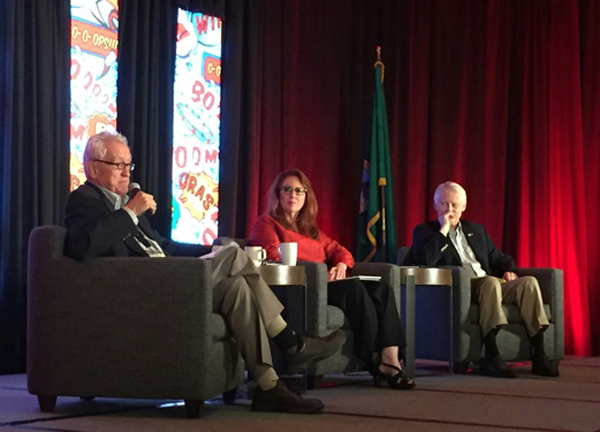SOS panel: Wyman talks elections with Munro, Reed
Former Secretary of State Ralph Munro (left) talks about an elections issue as current Secretary of State Kim Wyman and her predecessor, Sam Reed, listen. (Photo courtesy of Lori Augino)
The current and two most recent secretaries of state for Washington were featured guests at the annual state elections conference in SeaTac on Thursday, sharing their stories and experiences from the past 34 years during a panel discussion.
Ralph Munro, who served 20 years as secretary of state beginning in 1981, traced Washington’s amazing progress in elections during recent decades. Munro said the state became a national leader by promoting voting rights for 18-year-olds, a “Motor Voter” program that allows citizens to register to vote at the time of acquiring a driver’s license, and major technological advances. He urged the election officials at the conference to continue vigorous outreach programs, particularly for voters with disabilities.
Sam Reed, who served as Thurston County Auditor for 23 years before becoming SOS in 2001, said the state has gone through a number of court challenges, including the fight to preserve wide-open Top 2 Primary voting, and hundreds of reforms needed after the ultra-close 2004 governor’s race that called Washington’s election system into question. Reed noted that WA helped pioneer online voter registration, online candidate filing and online voters’ guides and expanding voter information in general. He also talked about college civics tours and other strategies for engaging younger voters.
Kim Wyman, who was elected secretary of state in 2012 after succeeding Reed as Thurston County Auditor 12 years earlier, said the state faces many technology challenges, as well as adjusting to federal Help America Vote Act dollars drying up. Wyman said as the state adapts to new technology, it must be done carefully and in close collaboration between state and county elections offices. She said she was reminded in the early digital age that people were choosing between Beta and VHS for video players, and how if you made the wrong choice it had huge ramifications. She said that example has stuck with her. Adopting new voting equipment needs to be carefully made, Wyman added.
Sitting in armchairs on a stage before a packed ballroom crowd, the three secretaries bantered with each other and answered questions from attendees. At the end of their talk, Munro summed it up: “We faced a lot of big challenges over the decades and we always figured out a smart way to address those challenges. We’ve proven we’re capable of making smart decisions for the future.”
The annual elections conference, sponsored by the Washington State Association of County Auditors, has included workshops on steps being taken by the state and county election offices to move toward a new generation of equipment and better ways of tracking voter registration.
Matt Boehmer, director of the Federal Voting Assistance Program in Washington, D.C., told the conference that our Washington is doing a lot of things right with its military voting program. “You guys are rock stars in Washington state,” Boehmer exclaimed. “Holy cow! You’re doing some great things.” Boehmer noted that Washington sent out 60,000 ballots in the last election to military and overseas voters, a number eclipsed only by California and Florida. He added that Washington’s ballot rejection rate was only 1 percent, much better than the 5 percent national average.
Matthew Masterson of the U.S. Election Assistance Commission also spoke at the gathering.
The conference has been attended by all 39 County Auditors or election leaders, as well as several hundred election administrators from across the state for training and sharing ideas. Retiring King County Elections Director Sherril Huff was honored at the conference for her years of service. Sessions were held on the upcoming 2016 election, emergency preparedness, next-generation voting systems, communications strategies and effective services for military and overseas voters.
